January 7, 2022
Search Results for: values
November 26, 2021
Doing what you love may not automatically make you happier at work
by Dr Tracy Brower • Features, Wellbeing, Workplace
 There is a classic saying which has shaped our job choices for years: “Do what you love, the money will follow.” New research suggests this may be true, although not in the way it was originally conceived. The typical logic train has suggested job interest shapes satisfaction and, in turn, satisfaction may drive better performance. However, new research published in the Journal of Vocational Behavior provides some fresh perspectives. It turns out satisfaction has many facets. While interest is one component in job satisfaction, it is not the primary component. Elements such as the organization, relationships with colleagues, leadership and compensation are actually more important than interest in predicting satisfaction. More →
There is a classic saying which has shaped our job choices for years: “Do what you love, the money will follow.” New research suggests this may be true, although not in the way it was originally conceived. The typical logic train has suggested job interest shapes satisfaction and, in turn, satisfaction may drive better performance. However, new research published in the Journal of Vocational Behavior provides some fresh perspectives. It turns out satisfaction has many facets. While interest is one component in job satisfaction, it is not the primary component. Elements such as the organization, relationships with colleagues, leadership and compensation are actually more important than interest in predicting satisfaction. More →
November 23, 2021
Wondering what to do about that office of yours? Hold the line.
by Louis Wustemann • Features, Flexible working, Property, Workplace design
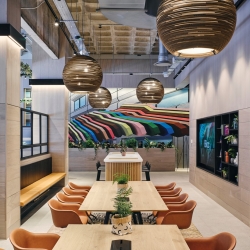
At the end of April, New York magazine’s cover feature was headed ‘Remember the Office?’ The article reminisced about a world of cubicles and water-coolers, coffee points and staff parties. Its tone was elegiac, implying that it wasn’t just the enforced distance of 13 months of COVID-19 restrictions that lent enchantment to communal workspace, but the possibility that offices had gone for good.? More →
November 18, 2021
Creating a supportive environment for vital deskless workers
by Jayne Smith • Flexible working, News, Working lives
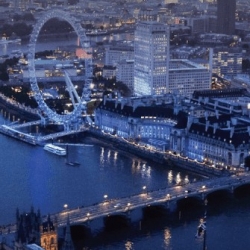 The Josh Bersin Company a research and advisory company focused on HR and workforce trends and issues, has released its latest report based on insights from its ongoing Big Reset executive working groups. The report, The Big Reset Playbook: Deskless Workers, focuses on the recommended practices needed to create optimal work experiences for “deskless” employees in retail, healthcare, manufacturing, hospitality, transportation, and other sectors. More →
The Josh Bersin Company a research and advisory company focused on HR and workforce trends and issues, has released its latest report based on insights from its ongoing Big Reset executive working groups. The report, The Big Reset Playbook: Deskless Workers, focuses on the recommended practices needed to create optimal work experiences for “deskless” employees in retail, healthcare, manufacturing, hospitality, transportation, and other sectors. More →
November 12, 2021
Manchester’s office market set to be fuelled by growth in SMEs
by Jayne Smith • Cities, News, Property
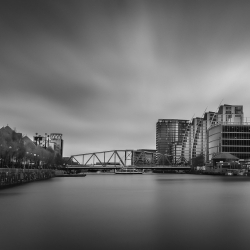 Manchester’s office market could see a boost thanks to its 22,850 SME businesses says Cluttons, who have recently launched an office on King Street in the City. Recent research by distribution company Citisprint highlighted that Manchester’s SMEs are also the most confident with 33 percent saying their business is in better shape post-pandemic, and 52 percent expecting to grow in the next 12 months. More →
Manchester’s office market could see a boost thanks to its 22,850 SME businesses says Cluttons, who have recently launched an office on King Street in the City. Recent research by distribution company Citisprint highlighted that Manchester’s SMEs are also the most confident with 33 percent saying their business is in better shape post-pandemic, and 52 percent expecting to grow in the next 12 months. More →
November 11, 2021
Going with the flow in the way we work
by Mark Eltringham • Features, Workplace design
Throughout history we’ve been aware of the state we now refer to as flow. It describes the sensation of existing purely in the moment of some activity, effortlessly achieving what we have set out to achieve and unaware of distractions. Mystics have described it as ecstasy, artists as rapture and athletes as in the zone. This state was first described as flow by the Hungarian psychologist Mihály Csíkszentmihályi in 1975 and has been developed by him and a wide range of other researchers in a number of fields since that time.
The essential characteristic of flow is an individual’s total and enjoyable absorption in an activity to the point that they lose a sense of space and time. It is related to focus but it is not the same. Flow is a state of transcendence and it is just as important in office design as any other domain of human activity.
The idea has been widely talked about as a desirable state in which to complete work, especially creative tasks. Indeed, the idea of heightened states while engaged in tasks predates the work of Csíkszentmihályi. Perhaps the best-known organisational psychologist of all time Abraham Maslow coined the term peak experience to describe intensely joyous and exciting moments. In these moments, we feel more whole, integrated, aware of ourselves and deeply happy. Maslow described them as those “moments of highest happiness and fulfilment” in his 1964 work Religions, Values, and Peak Experiences. He linked them to the idea of self-actualisation from his famous Hierarchy of Needs.
Flow is more common at work
Such moments are more likely when we are at work than in other periods of our lives and are relatively common. According to an article by Csíkszentmihályi published in Psychology Today, in a survey of 6,469 Germans, when asked how often they entered a flow state: 23 percent said often; 40 percent said sometimes; 25 percent said rarely; and 12 percent said never or don’t know.
[perfectpullquote align=”right” bordertop=”false” cite=”” link=”” color=”” class=”” size=””]Organisations should seek to develop activities, cultures and environments that make it easier for people to enter flow states[/perfectpullquote]
His own research using more objective methods found that work was better suited to the creation of flow states than passive activities such as watching television, leading him to conclude that ‘work is much more like a game than most other things we do during the day. It usually has clear goals and rules of performance. It provides feedback either in the form of knowing that one has finished a job well done, in terms of measurable sales or through an evaluation by one’s supervisor. A job tends to encourage concentration and prevent distractions, and ideally, its difficulties match the worker’s skills.’
Csikszentmihályi argues that organisations should seek to develop activities, cultures and environments that make it easier for people to enter flow states in their work. This isn’t just about making them more productive and more likely to have good ideas, although those are two of the most important outcomes. In his 2003 book Good Business: Leadership, Flow, and the Making of Meaning, Csikszentmihályi argues that fostering flow states improves morale by creating a sense of greater happiness and accomplishment. He looks at how flow states are essential for the creation of ‘good work’ in which you enjoy the feelings of “doing your best while at the same time contributing to something beyond yourself.” He also highlights the importance of regular feedback as an essential ingredient for the fostering of flow states.
For this reason, flow is not just an important goal for the individual. Because it contributes to organisational goals such as higher productivity, better ideas and improved morale, it can improve the overall performance of the organisation and encourage greater collaboration.
Csikszentmihályi concludes that there are three conditions for the creation of flow states at work:
• One must be involved in an activity with a clear set of goals and progress. This adds direction and structure to the task.
• The task at hand must have clear and immediate feedback. This helps the person negotiate any changing demands and allows them to adjust their performance to maintain the flow state.
• One must have a good balance between the perceived challenges of the task at hand and their own perceived skills. One must have confidence in one’s ability to complete the task at hand.
Designing for flow
There are several characteristics of an office environment that can encourage flow states and meet these prerequisites. The ability to focus and work free from distraction is perhaps the most obvious, but so too are the creation of an enjoyable working culture, strong bonds with colleagues, immediate feedback on tasks, an affinity with each job and regular communication with colleagues.
This demands a sophisticated and intelligent approach that embraces a number of features of office design. The most progressive office design concepts seem ready-made to deliver a working environment that can encourage flow states. By empowering people to work in ways that suit them best with a choice of work styles and offering the sorts of spaces in which people can enter flow states undisturbed, such offices increase the likelihood of flow. This principle of office design aligns completely with the characteristics of flow states.
In addition, the democratic structure of the space makes feedback significantly more likely, while the social spaces, collaborative space and more playful aspects of the design encourage people to be aware of ‘something greater than themselves’.
November 8, 2021
Why real estate businesses can’t afford not to invest in sustainability
by Jayne Smith • Environment, News
 The World Green Building Council (WorldGBC), a global network accelerating sustainability and decarbonisation in the building and construction sector, has set out the updated value proposition to drive investment in a sustainable built environment by launching a new flagship report ‘Beyond the Business Case’ at COP26 in Glasgow. More →
The World Green Building Council (WorldGBC), a global network accelerating sustainability and decarbonisation in the building and construction sector, has set out the updated value proposition to drive investment in a sustainable built environment by launching a new flagship report ‘Beyond the Business Case’ at COP26 in Glasgow. More →
October 28, 2021
High hopes Gen Z will close the digital skills gap – but young people are in a confidence crisis
by Jayne Smith • News, Technology
 Three-quarters of tech leaders think Gen Z will solve the digital skills shortage (72 percent), with an even higher number (77 percent) believing these ‘digital-natives’ have the best ability of any generation. However, while half of Gen Z have a career in tech or firm plans to pursue one in the next five years (46 percent), they have low confidence in their digital abilities. More →
Three-quarters of tech leaders think Gen Z will solve the digital skills shortage (72 percent), with an even higher number (77 percent) believing these ‘digital-natives’ have the best ability of any generation. However, while half of Gen Z have a career in tech or firm plans to pursue one in the next five years (46 percent), they have low confidence in their digital abilities. More →
October 14, 2021
Wellbeing, mental health and loneliness become major business concerns
by Jayne Smith • Business, News, Wellbeing
October 12, 2021
Time for businesses to step up and deliver flexibility and wellbeing for workers
by Nick Gold • Comment, Flexible working, Wellbeing
 At this time of year, with events such as Happiness at Work Week and Mental Health Awareness Day, mental health and wellbeing have been brought into sharp focus. Businesses are starting to look forward with a small degree of optimism. This optimism is not necessarily derived from the current state of their business or even their sector, but rather from being able to make proactive plans rather than in reactive mode which has been the default setting for the past 18 months. This is a challenge, but one which can be met with a degree of excitement and anticipation as the business has a chance to make an impact both within its business surroundings, but also for the people who work within the business. More →
At this time of year, with events such as Happiness at Work Week and Mental Health Awareness Day, mental health and wellbeing have been brought into sharp focus. Businesses are starting to look forward with a small degree of optimism. This optimism is not necessarily derived from the current state of their business or even their sector, but rather from being able to make proactive plans rather than in reactive mode which has been the default setting for the past 18 months. This is a challenge, but one which can be met with a degree of excitement and anticipation as the business has a chance to make an impact both within its business surroundings, but also for the people who work within the business. More →







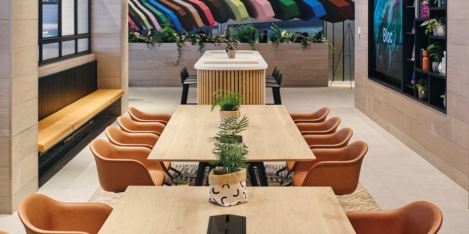

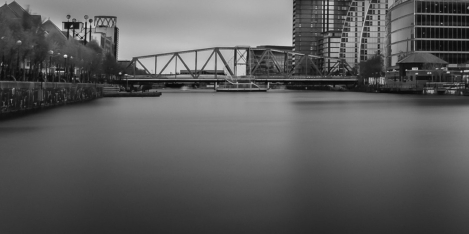
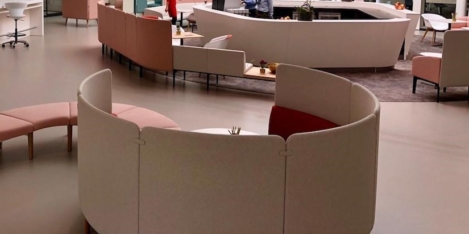
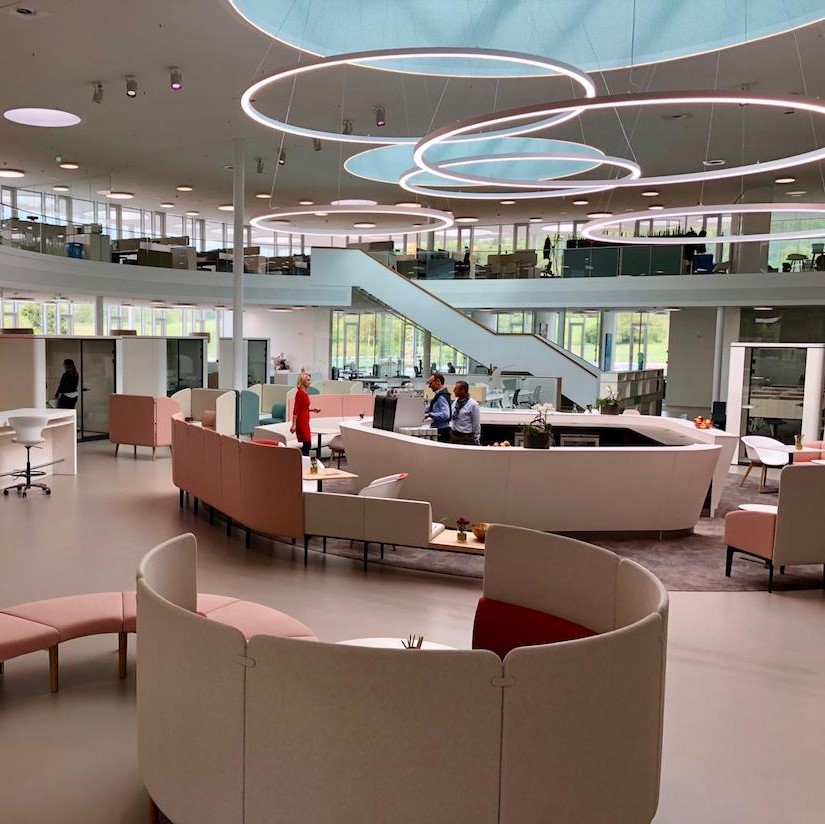



 Nearly two thirds (61 percent) of HR and people professionals strengthened their skills – through either upskilling or reskilling – as a result of their organisation’s response to the COVID-19 pandemic, the latest People Profession survey report from the
Nearly two thirds (61 percent) of HR and people professionals strengthened their skills – through either upskilling or reskilling – as a result of their organisation’s response to the COVID-19 pandemic, the latest People Profession survey report from the 
 Businesses across all sectors are having to re-think their employee experience and wellbeing strategies to provide support to staff in the wake of the pandemic. According to new research from
Businesses across all sectors are having to re-think their employee experience and wellbeing strategies to provide support to staff in the wake of the pandemic. According to new research from 










December 6, 2021
We must wake up to the realities of workplace sustainability
by Oliver Cripps • Comment, Environment, Workplace design